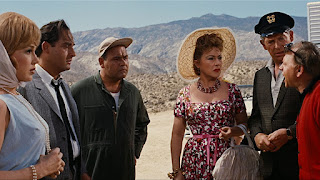Moving onto the 70s.
Ugh.
A lot of critics claim that the 70s is the greatest decade for movies. It’s not. In fact, I think it’s the worst. It’s certainly the most overrated. And that goes for music, too. We see an influx of sex, drugs, and profanity, thanks in large part to “gritty” “urban” movies. New York is all over. Disaster movies are another big thing. Oh, and Disney animation has probably its worst decade, but a solid decade with “live-action” movies (most of which are unknown today: The London Connection, Snowball Express, The World’s Greatest Athlete, The North Avenue Irregulars, and even Freaky Friday, which I finally watched, was pretty good). Bond also has his worst decade by a mile (I can’t stand Roger Moore). But…we have the first blockbusters, the rise of Spielberg, and some massive franchises are born, so there is some good among all the drivel.
Before my list (remember this is “best,” not necessarily “favorite”), a few notable movies not mentioned, because I have not seen them: MASH, A Clockwork Orange, The Last Picture Show, Cabaret, Chinatown, Barry Lyndon, Network, Annie Hall, The Deer Hunter, Kramer vs. Kramer, Apocalypse Now. You also won’t see any Scorsese (most I haven’t seen, if I have seen it, it’s not worth mentioning) and you definitely won’t see The Godfather (the single most overrated movie of all time, it’s really, really bad). Also, I finally watched Monty Python and the Holy Grail. People actually find that funny? I didn’t even chuckle once.
Honorable
Mentions: The Muppet Movie, Big Jake, The Wind and the Lion, Robin Hood, Tora!
Tora! Tora!, The Andromeda Strain, American Graffiti, The North Avenue
Irregulars
Top 10 (counting down):
10. The Thirty Nine Steps (1978) This isn’t a bad movie, obviously,
but you can tell how little regard I have for the decade when this is in the
top ten. I’m guessing few people today
have seen it. It stars Robert Powell,
i.e. Jesus from Jesus of Nazareth (which, if I were considering miniseries,
would definitely be on this list).
9. Close
Encounters of the Third Kind (1977)
Again, it’s a good movie, but
probably not in the top half of Spielberg movies. Thanks to it, however, I did go out of my way
to visit Devil’s Tower when I went to Mount Rushmore (it’s pretty cool to see
in person).
8. The Many
Adventures of Winnie the Pooh (1977)
Here I am blatantly cheating, because
it’s actually a collection of short Winnie cartoons that were originally released
in the 60s but packed together in 1977.
But it is wonderfully fun.
7. Fiddler on the Roof (1971)
Now we get into movies that deserve
at least consideration for any decade’s Top 10.
One of the greatest musicals of all time, and it’s even more beautiful
when you know the historical context. A
timeless (at least for recent generations) struggle over tradition vs. change.
6. Patton (1970)
George C. Scott is nothing like the
real Patton, but he’s an amazing cinematic Patton. And it gets the disdain for “Monty” right, he
was a loser.
5. Alien (1979)
The top 5 is almost impossible to
pick between. Here we have the greatest
scifi horror film of all time, introducing us to one of the greatest creatures
of all time. When Ridley Scott is on, he
is amazing.
4. Superman
(1978)
3. Star Wars (1977)
To watch the original cut of this
movie is to fall in love with movies.
George Lucas was a genius of story telling (dialogue…maybe not). Darth Vader is the greatest villain of all
time. Jaws created the blockbuster, but
this created the cinematic event with all the tie-ins. It remains the most important movie ever
made.
2. Jaws (1975)
Speaking of the movie that created
the blockbuster. Some people today knock
it because “the shark looks fake.” Talk
to audiences in 1975. But it’s also much
more than just the shark. It is the
perfect example of slowly introducing the monster, horror through inference,
and a perfect payoff. And, of course, it
truly introduced the world to Spielberg and Williams, the greatest
director/composer combo of all time.
1. Rocky (1976)
All that being said about Jaws, it
doesn’t take the top spot because Rocky is the perfect underdog tale. Again, people knock it because of Stallone,
but if you really pay attention he is incredible in this movie. And don’t forget that he wrote it, too. It is one of the few examples of the gritty
70s movie done right. All of the top 5
created franchises, some bigger than others, and most of them work. And again, any one of the them could take the
top spot, but Rocky and its triumph through adversity, the true American story
of grinding to the top, and the genius move to have him win without winning,
puts it just over the top.
Extra fun: the best movie scores of the decade (John Williams and Jerry Goldsmith absolutely dominate this decade, so rather than listing theirs individually, because it would only be them, I’m listing theirs collectively)
John Williams (Star
Wars, Superman, Jaws, Close Encounters, Midway, Towering Inferno…)
Jerry Goldsmith
(Star Trek: The Motion Picture, Alien, Patton, MacArthur, The Wind and the
Lion…)
King Kong (John
Barry)
Robin and
Marian (Barry)
Big Jake (Elmer
Bernstein)
Other music from the decade: Again, the music is so overrated, and not just terrible disco. I like a little bit of classic rock, the problem is a little bit of classic rock means roughly two songs for 15 minutes.












.jpg)















.jpg)

.jpg)



_hires.jpg)











